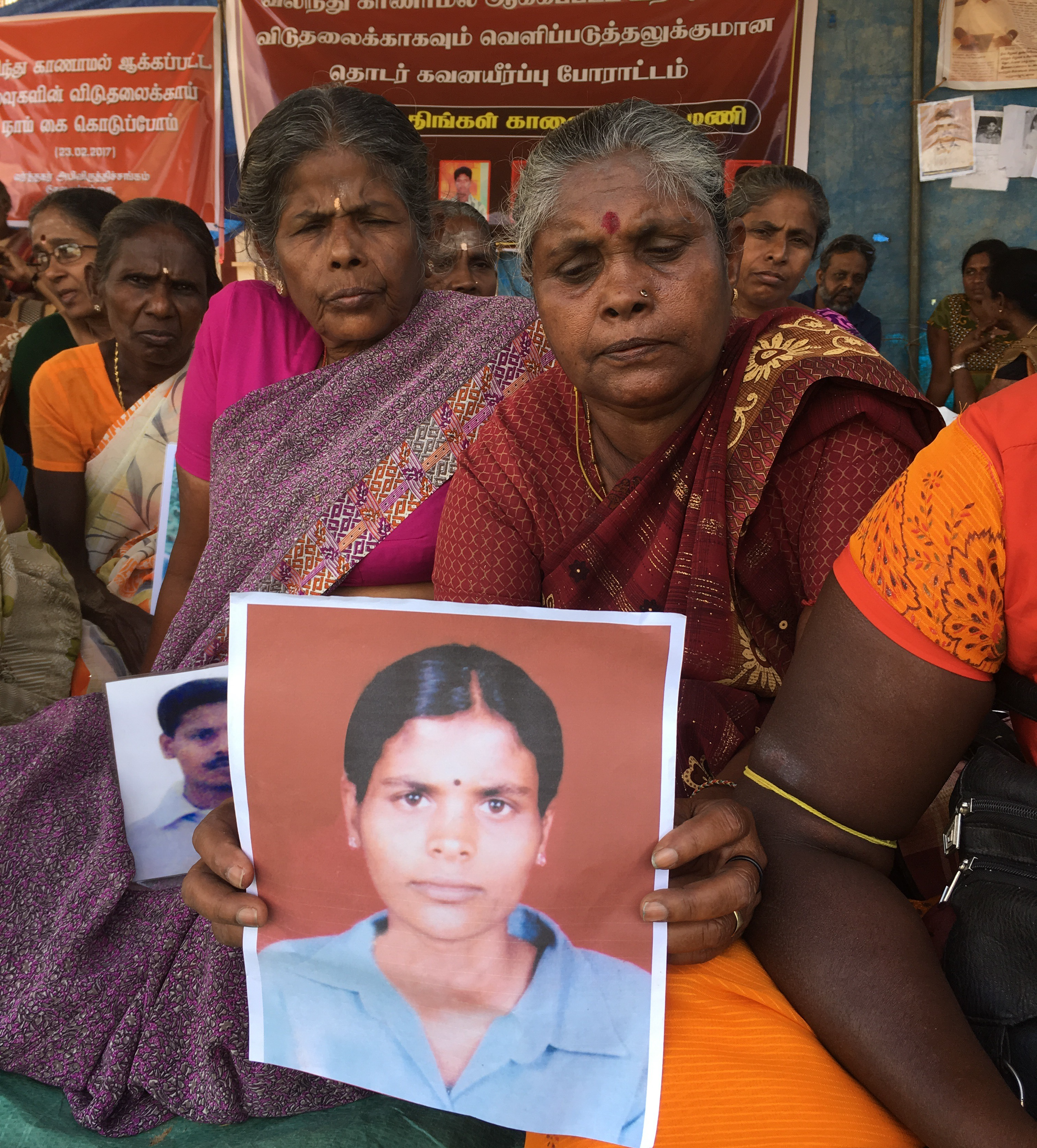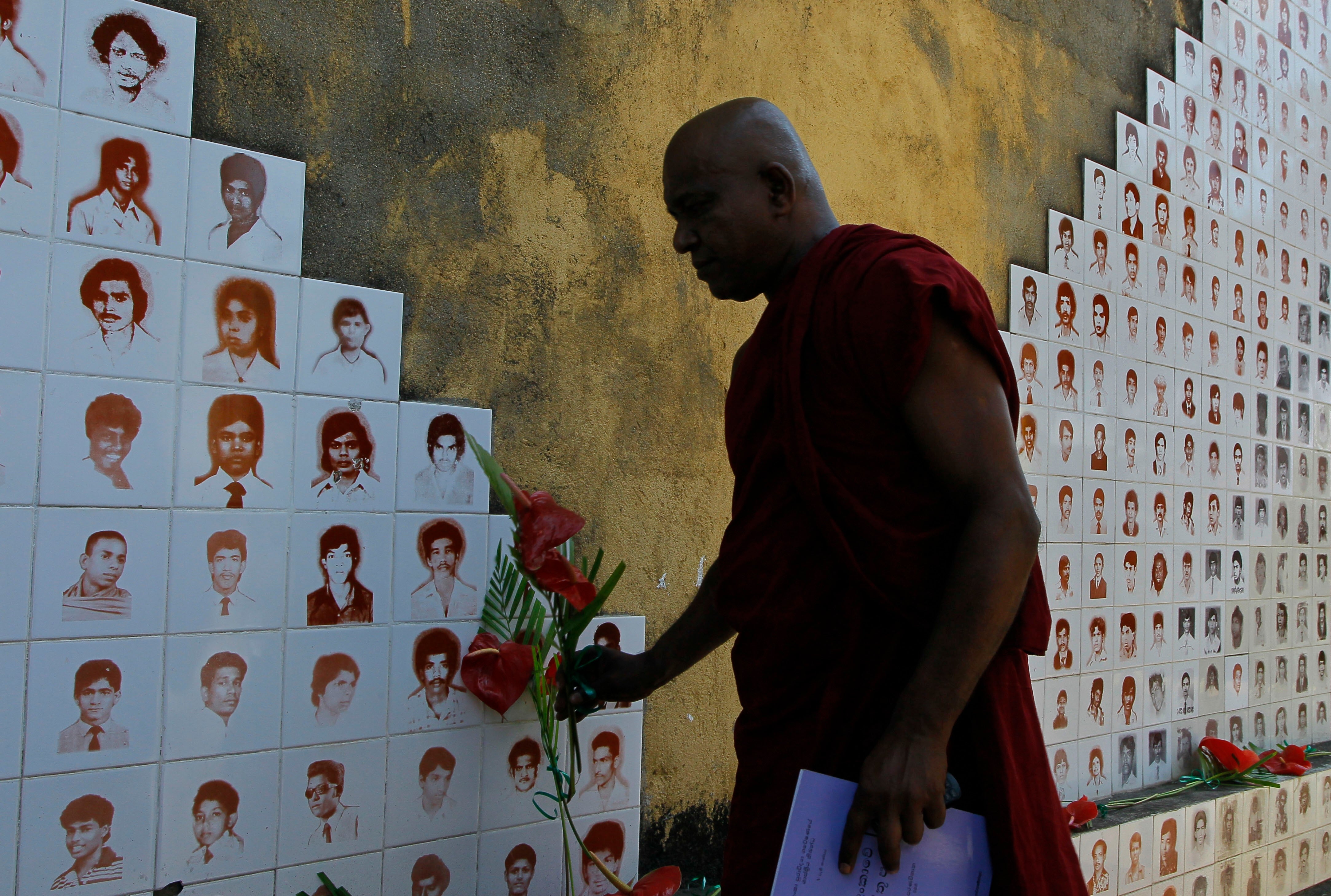Here Are the Families Trying to Find Them
by Whitney Kimball, ‘Jezebel’ The Slot, New York, NY, July 1, 2018
If you pass a protest for “the Disappeared” today, it’s probably not referencing the migrant families separated by Trump’s zero-tolerance policy, but another massive population of people separated from their families whom we don’t hear about much: an estimated 60,000-100,000 people–nearly enough to fill Yankee Stadium twice over–who have gone missing since the start of the Sri Lankan Civil War in the 1980s. After the war ended in 2009, thousands of Tamil fighters surrendered but were never returned to their families, as well as children and civilians who were taken by the government. Many of “the Disappeared” are believed to be held in secret detention camps to this day, which is crazy, although Western media coverage of this is nil. (Five mothers have even claimed to have seen their children in a photo with the president).
In New York, Toronto, Switzerland, Berlin, Sydney and London, protestors are expressing solidarity with family members, primarily women, who will, as of Monday, have been sitting in roadside protests in Sri Lanka for 500 days. A journalist with Ground Views reported in February of hearing that seven participants have died since the protests began.

Image: Taken at Kilinochchi Protest, February 2017 (Dharsha Jegatheeswaran)
Dharsha Jegatheeswaran, a co-organizer of today’s protests, explains to Jezebel why the search for the Disappeared is as relevant to the U.S. as the fight to reunite migrant families. This interview has been edited for length.
JEZEBEL: What does the humanitarian crisis in Sri Lanka say about global attitudes toward refugees and separated families in general? How are these families typically depicted in the media?
Dharsha Jegatheeswaran: I think the fact that a group of primarily women have been protesting roadside for almost 500 days in Sri Lanka, but disappearances has gone largely unreported by Western media with the exception of a few, signals an overall shift from interest in human rights stories. When grandmothers in Argentina did this a few decades ago, it became a globally-recognized phenomenon. But in this case, these women’s stories are even ignored or excluded from the post-war narrative of Sri Lanka–now seen as an economy of “booming tourism, infrastructure, and growth” despite having the second-highest number of disappearance complaints reported by the UN Working Group on Enforced and Involuntary Disappearances–second only to Iraq. But also the media often reduces these women to a gendered notion of “victimhood” which removes their agency, their immense political force and mobilization efforts.

Image: A Sri Lanka Buddhist monk places flowers at a monument during a commemoration of disappeared people at Raddoluwa, a suburb of Colombo, Sri Lanka, Monday, Oct. 27, 2014. (AP)
Over 100,000 primarily Tamil individuals are reported to have been disappeared during the Sri Lankan armed conflict in a number of horrific ways including white van abductions, at military/police checkpoints, and after surrendering to security forces. Almost 10 years after the war ended in Sri Lanka, there has still be no resolution for a single case of enforced disappearance during the conflict, and many disappearances continued to occur during this time.
JEZEBEL: What has the fight for the Disappeared looked like on the ground over the past 500 days?
DJ: In addition to the continuous roadside protest where the women spend days and nights in a small haphazard shelter next to the main highway in one case, or in front of government offices in the others, the women have also been meeting with various diplomats and politicians to no avail. Some of them also made a trip to Geneva in March to advocate for their issues at the UN human Rights Council session and are there again this month. They pivoted to the international community with their advocacy after the president turned his back on them and reneged on his promises in November 2017. [Author note: Protestors report that President Maithripala Sirisena agreed to meet with them on their hundredth day and then cancelled.]
JEZEBEL: How would you like to see the government address this problem?
DJ: We are protesting in solidarity with families demands for the Sri Lankan government to: (1) release the list of surrendees from 2009; (2) release a list of secret detention centres and their lists of detainees (past and present); and (3) release a list of all detainees under the draconian Prevention of Terrorism Act (PTA). And overarching all of this, their demand to either be given their disappeared loved ones back, or be given truth and justice for what happened to them.
JEZEBEL: Why does the U.S. need to be more aware of family separation in Sri Lanka?
DJ: The protesting Tamil families of the Disappeared is a stark reminder of what happens when a government that seeks to silence and dismantle minority communities goes unchecked. It’s also a reminder (on a more positive note), that when you tear families apart, the pain and loss that’s left will only grow stronger, inspiring action and mobilizing bigger movements. Whether its families in Sri Lanka or Texas, it’s the international communities’ job to stand in solidarity, amplify their voices and demand accountability.
JEZEBEL: What can I do right now?
DJ: You can attend one of the solidarity rallies; see Instagram or Facebook. We will have a petition go live on Sunday night. [We will update the post when it does.]
https://theslot.jezebel.com/what-those-signs-for-the-disappeared-mean-and-why-you-s-1827270647